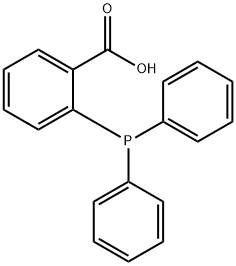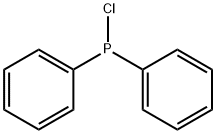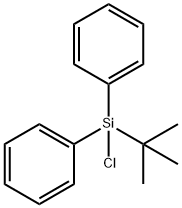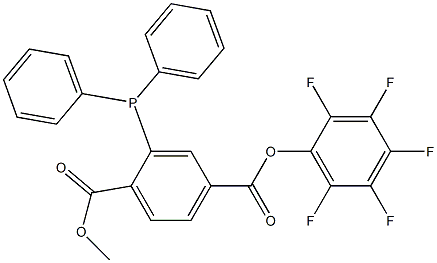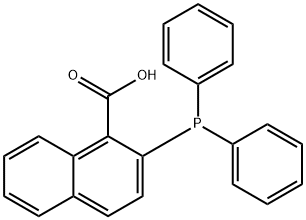2-(Diphenylphosphino)benzoic acid , 97% , 17261-28-8
Synonym(s):
(2-Carboxyphenyl)diphenylphosphine
CAS NO.:17261-28-8
Empirical Formula: C19H15O2P
Molecular Weight: 306.3
MDL number: MFCD00674024
EINECS: 241-293-7
| Pack Size | Price | Stock | Quantity |
| 1G | RMB32.00 | In Stock |
|
| 5G | RMB99.20 | In Stock |
|
| 25G | RMB393.60 | In Stock |
|
| others | Enquire |
PRODUCT Properties
| Melting point: | 174-181 °C (lit.) |
| Boiling point: | 159 °C |
| storage temp. | Inert atmosphere,Room Temperature |
| solubility | Chloroform (Slightly), DMSO (Slightly), Methanol (Slightly) |
| pka | 3.72±0.36(Predicted) |
| form | Powder |
| color | Light yellow |
| Stability: | Hygroscopic |
| InChI | InChI=1S/C19H15O2P/c20-19(21)17-13-7-8-14-18(17)22(15-9-3-1-4-10-15)16-11-5-2-6-12-16/h1-14H,(H,20,21) |
| InChIKey | UYRPRYSDOVYCOU-UHFFFAOYSA-N |
| SMILES | C(O)(=O)C1=CC=CC=C1P(C1=CC=CC=C1)C1=CC=CC=C1 |
| CAS DataBase Reference | 17261-28-8(CAS DataBase Reference) |
| EPA Substance Registry System | Benzoic acid, 2-(diphenylphosphino)- (17261-28-8) |
Description and Uses
The ligand (R ,R )‐1,2‐Bis(aminocarbonylphenyl‐2′‐diphenylphosphino)cyclohexane[138517-61-0] can be prepared by the coupling of (1R ,2R )‐(-)‐1,2‐diaminocyclohexane [20439-47-8] with 2‐(diphenylphosphino)benzoic acid [17261-28-8], using reagents such as DCC.
An alternative procedure has been developed where by (1R ,2R )‐(+)‐1,2‐diaminocyclohexane L‐tartrate salt [39961-95-0] is coupled to a mixed anhydride of 2‐(diphenylphosphino)benzoic acid and diphenylchlorophosphate.The procedure is reproduced below 2‐(Diphenylphosphino)benzoic acid (20 g, 65.3 mmol, 2 equiv) is suspended in dichloromethane (150 mL) and cooled in an ice‐water bath to 0°C (internal temperature). Triethylamine (10.1 mL, 71.8 mmol, 2.2 equiv) is added dropwise and a clear solution is obtained. This process is exothermic and a rise in temperature to 5°C is observed. The solution is re‐cooled to 0°C and diphenylchlorophosphate (13.4 mL, 64.7 mmol, 1.98 equiv) is added slowly, maintaining the internal temperature between 0–5°C. The yellow solution is stirred for 1 h at 0°C. (1R, 2R )‐(+)‐1,2‐Diaminocyclohexane‐L‐tartrate salt (8.63 g, 32.65 mmol, 1 equiv) is suspended in water (50 mL, 5.8 vol) and potassium carbonate (15 g, 107.8 mmol, 3.3 equiv) is added. This process is exothermic and a clear solution is obtained after approximately 10 min. After 30 min, the clear aqueous solution of diamine is added to the mixed anhydride solution at 0°C, and the resulting yellow two‐phase mixture is stirred for 2 h at 0°C, then allowed to warm to room temperature. After 14 h, the mixture is poured into a separating funnel and 200 mL of dichloromethane and 100 mL of water are added. The organic phase is separated, washed with 2 N HCl (100 mL) and saturated aqueous NaHCO3 solution (100 mL), then dried over magnesium sulfate. The dried organic phase is filtered through a silica pad and the pad is washed with dichloromethane (50 mL). The combined filtrates are evaporated to dryness under reduced pressure, producing a yellow foam (22.3 g, 99% crude). The foam is crystallized from boiling acetonitrile (390 mL, 17.5 vol) to afford a white crystalline solid. The solid is dried under vacuum to provide the phosphine ligand (15 g, 67%).
Safety
| Symbol(GHS) |  GHS07 |
| Signal word | Warning |
| Hazard statements | H315-H319-H332-H335 |
| Precautionary statements | P261-P264-P271-P302+P352-P304+P340+P312-P305+P351+P338 |
| Hazard Codes | Xi,Xn |
| Risk Statements | 36/37/38-20/22 |
| Safety Statements | 26-36-36/37/39 |
| WGK Germany | 3 |
| RTECS | DG9287500 |
| TSCA | Yes |
| HS Code | 29319090 |

